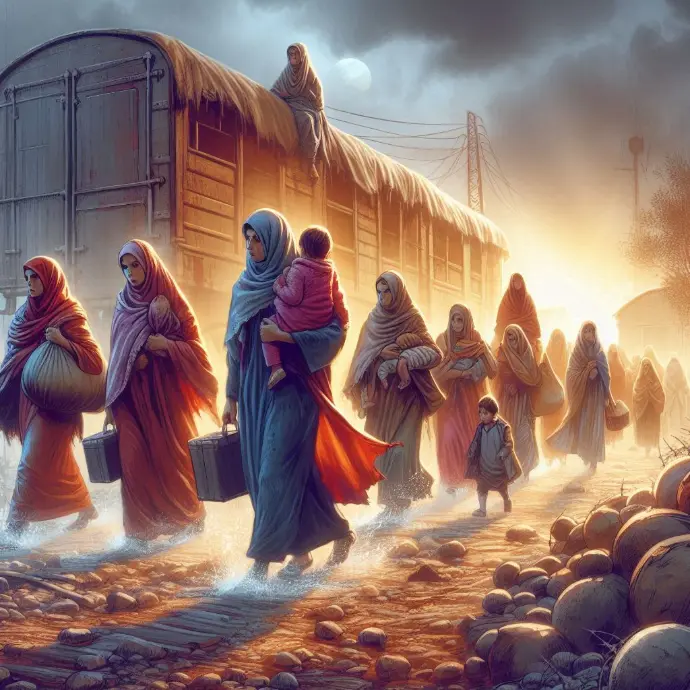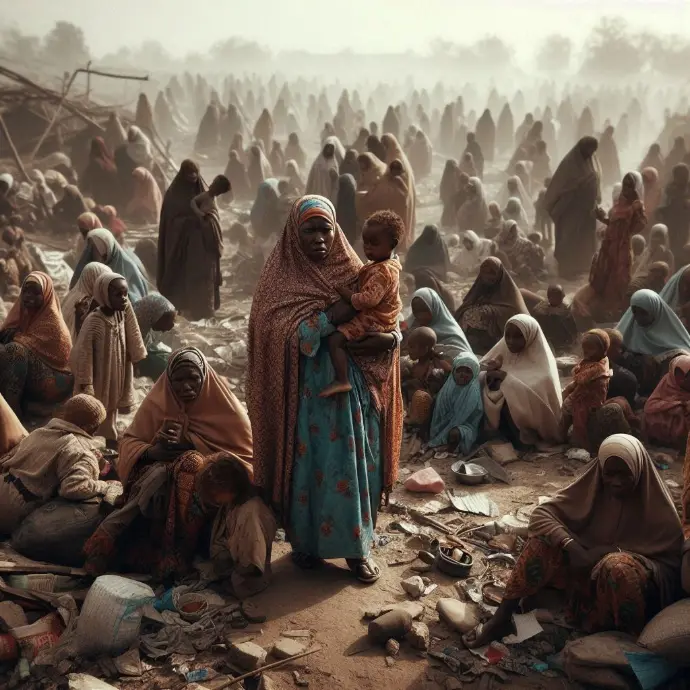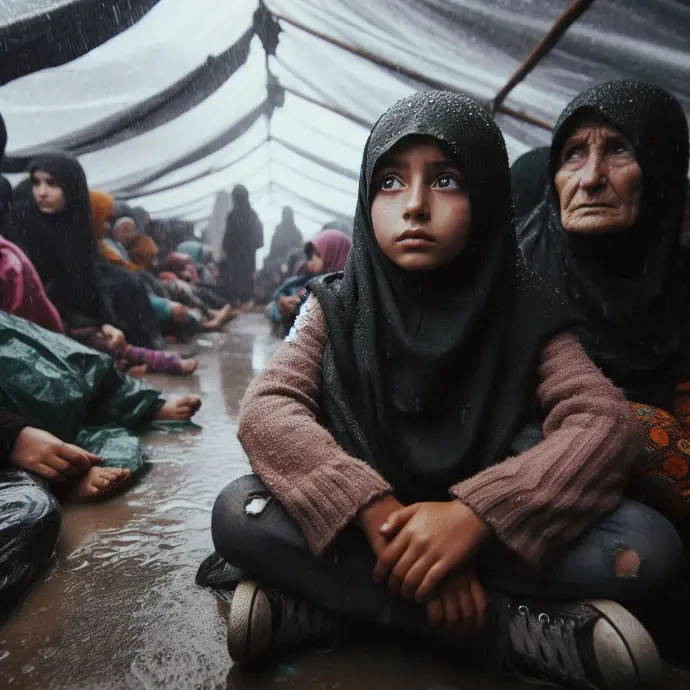Refugees and displaced women:
The specific challenges of women
in humanitarian crises
In our feature article, we will explore in depth and analyze the challenges that women face in humanitarian crises. In our feature article "Refugees and displaced women: The specific challenges of women in humanitarian crises" we will address in detail the unique challenges that women face in crisis situations.
Introduction
In the context of humanitarian crises, refugee and displaced women face specific challenges that require special attention.
In the context of humanitarian crises, refugee and displaced women face specific challenges that require special attention. From the definition of humanitarian crises to the impact they have on women, it is essential to understand the complexity of these situations in order to address them effectively. Below, the specific challenges faced by women in humanitarian crises will be explored in detail, as well as the importance of addressing these issues in a comprehensive manner.
Humanitarian crises are characterized by emergency situations that put the lives and well-being of a large number of people at risk. These situations can be triggered by armed conflicts, natural disasters, economic crises or epidemics, among other factors. In this context, there is a significant disruption of social and support structures, which affects men, women, boys and girls differently.
Humanitarian crises involve a lack of access to basic services such as food, drinking water, shelter and health care, which generates a devastating impact on the affected population. In this scenario, women face additional challenges due to their gender condition, which requires specific and differentiated responses to ensure their protection and well-being.
It is essential to understand that humanitarian crises not only represent a threat to people's physical survival, but also have a significant impact on their mental and emotional health, as well as their fundamental rights.
Attention to the specific challenges faced by women in humanitarian crises is crucial, as their situation can be exacerbated by factors such as gender-based violence, lack of access to reproductive health services, discrimination and vulnerability to exploitation and abuse. For this reason, it is necessary to adopt a comprehensive approach that takes into consideration the specific needs of women at all stages of the humanitarian response.
Addressing these challenges is not only a matter of justice and equity, but is also essential to ensure the effectiveness of humanitarian interventions and the protection of the fundamental rights of refugee and displaced women.
Failure to address these specific challenges can result in increased vulnerability of women, as well as a negative impact on the reconstruction and stabilization of communities affected by the humanitarian crisis.
Refugee and displaced women face multiple challenges during and after a humanitarian crisis. Lack of security, exposure to gender-based violence, loss of support networks, separation from their families and difficulty accessing basic services are just some of the obstacles they face in this context.
In addition, women may experience a differentiated impact on their reproductive health, economic autonomy and participation in decision-making, which can have long-term effects on their well-being and development.
It is critical to recognize that refugee and displaced women are not just passive victims of the crisis, but are also agents of change and resilience in their communities. It is therefore crucial to include their voices and perspectives in the design and implementation of humanitarian responses, as well as to ensure their active participation in the reconstruction and stabilization of their communities.
Specific challenges for women in humanitarian crises
In humanitarian crisis situations, women face unique challenges in accessing specialized health care. Reproductive health needs, such as access to contraceptives, prenatal care and safe delivery services, are critical for displaced and refugee women. In addition, medical care for women who have experienced gender-based violence, such as psychological care and treatment of physical injuries, is crucial in these settings.
The lack of adequate medical facilities, coupled with a shortage of trained personnel, further exacerbates the situation. The UN estimates that around 60% of maternal deaths in crisis settings could be prevented with the presence of skilled medical assistance and access to adequate facilities. Ensuring equitable access to specialized health care for women in humanitarian crises is critical to protecting their health and well-being, and requires urgent attention and significant resources from the international community.
Women in humanitarian crisis contexts face a heightened risk of gender-based violence, including rape, sexual abuse, child marriage and human trafficking. Lack of adequate safety and protection increases women’s vulnerability to these forms of violence, which represents a significant challenge in these circumstances.
Effective implementation of security measures, such as police presence in camps and shelters, as well as adequate lighting and safe reporting systems, are critical to protecting women from gender-based violence. Furthermore, providing psychological support and counselling services for those who have been victims of violence is crucial, in order to address both the physical and emotional after-effects of these traumas.
Access to economic resources and employment opportunities is another specific challenge faced by women in humanitarian crises. The loss of support networks and lack of access to paid employment hinder women’s ability to support their families and rebuild their lives in environments of forced displacement.
The creation of microfinance programs, job training and entrepreneurship opportunities for displaced and refugee women is essential to economically empower them. These initiatives not only provide them with the possibility of generating income, but also allow them to contribute to the economic development of the communities that host them.
Refugee and displaced women face specific challenges that significantly impact their mental and emotional health. Exposure to gender-based violence, loss of loved ones, insecurity and uncertainty about the future are factors that contribute to high levels of stress, anxiety and depression in women living in humanitarian crises.
In addition, refugee and displaced women often face additional difficulties in accessing adequate mental health services. Lack of resources, stigmatization and cultural and linguistic barriers can limit their ability to receive the necessary support. This situation can have a lasting impact on their psychological and emotional well-being, as well as that of their families.
Post-traumatic stress, anxiety and depression are common among women who have experienced humanitarian crises, and it is essential that humanitarian assistance efforts recognize and address these specific needs to ensure the comprehensive well-being of women in situations of refuge or forced displacement.
Human Rights and Gender
In humanitarian crisis situations, women face specific challenges that require special attention from human rights defenders. The role of these defenders is crucial in ensuring the protection of women's rights in contexts of conflict and displacement.
Human rights defenders play a critical role in advocating for the implementation of specific measures aimed at protecting refugee and displaced women. This includes promoting policies and programmes that address the particular challenges faced by women in these circumstances, such as gender-based violence, access to health care and the protection of their reproductive rights.
Gender-based violence is one of the most widespread and devastating human rights violations faced by women in humanitarian crisis contexts. Human rights defenders play a crucial role in advocating for the recognition of gender-based violence as a human rights violation, thereby helping to raise awareness of this issue and promoting the adoption of concrete measures to prevent it and address its consequences.
In addition, human rights defenders work to ensure that women who have been victims of gender-based violence have access to justice and adequate support services, as well as to promote the prevention of gender-based violence through awareness-raising and education in communities affected by humanitarian crises.
The recognition of gender-based violence as a human rights violation is essential to ensure the protection of women in humanitarian crisis situations, and human rights defenders play a crucial role in this process.
Gender equality is a fundamental principle in the promotion and protection of human rights. Human rights defenders work to ensure that women in humanitarian crises have equal access to humanitarian assistance, protection and resources, as well as to advocate for the inclusion of gender perspectives in all humanitarian responses.
In addition, human rights defenders promote the active participation of women in decision-making and in building sustainable solutions in humanitarian crisis contexts, recognizing that women's empowerment is fundamental to ensuring an effective and equitable response to these situations.
The work of human rights defenders is crucial to address the specific challenges faced by women in humanitarian crises, promoting the recognition of gender-based violence as a violation of human rights and working to ensure gender equality in all humanitarian responses.
Current challenges in the protection of women's rights
In the context of humanitarian crises, women face specific challenges that require coordinated international responses and cooperation between different actors. Lack of access to reproductive health services, exposure to gender-based violence and discrimination in accessing humanitarian aid are just some of the difficulties faced by refugee and displaced women.
International organizations and governments play a crucial role in providing humanitarian assistance that addresses the specific needs of women in crisis situations. Effective coordination between humanitarian agencies, as well as the allocation of specific resources for the protection of women's rights, are fundamental elements in the response to these crises.
It is essential to promote the active participation of women in the planning and implementation of humanitarian responses, ensuring that their voices are heard and taken into account at all stages of the process.
Gender discrimination plays a significant role in the way humanitarian responses are developed and implemented. Cultural and social norms, as well as unequal power structures, can result in the exclusion of women’s specific needs in the planning and delivery of humanitarian aid.
A lack of gender sensitivity in the distribution of aid, as well as the absence of gender-based violence protection protocols, contribute to women’s vulnerability in humanitarian crisis contexts. It is crucial that humanitarian responses recognize and address gender disparities in a comprehensive manner, ensuring that women’s specific needs are addressed effectively and equitably.
Training humanitarian personnel on gender issues and integrating gender-sensitive approaches into all phases of humanitarian response are fundamental steps to overcome the challenges arising from gender discrimination in crisis contexts.
Education plays a crucial role in protecting women's rights in humanitarian crises. Access to education not only provides tools for personal empowerment and autonomy, but also acts as a protection mechanism against exploitation, violence and forced recruitment in conflict situations.
Ensuring equal access to education for women and girls in humanitarian crisis contexts is essential to counter the devastating effects of social exclusion and deprivation of opportunities. Education not only offers a safe space for personal development, but also contributes to the reconstruction and stabilization of communities affected by humanitarian crises.
Furthermore, education represents a fundamental means to promote gender equality and challenge discriminatory norms and practices that perpetuate women's vulnerability in crisis contexts. Investing in educational programs tailored to the specific needs of displaced or refugee women and girls is crucial to ensure their long-term protection and empowerment.
The development of specific policies and programmes to address the challenges of refugee and displaced women is essential to the protection of human rights in humanitarian crisis situations. These policies and programmes must take into account the specific needs of women, which are often different from those of men in crisis contexts. Aspects such as reproductive health, security, education and economic empowerment of women in these settings need to be considered.
Specific policies and programmes must be designed with the active participation of affected women, ensuring that their voices are heard and taken into account in decision-making. The effective implementation of these measures requires collaboration between governments, international organisations, NGOs and civil society, in order to guarantee a comprehensive and coordinated response to the challenges faced by refugee and displaced women.
Furthermore, it is crucial that these policies and programmes are framed within respect for human rights and gender equality, ensuring that they not only address the immediate needs of women, but also promote their autonomy and dignity in the long term, contributing to their empowerment in contexts of humanitarian crises.
Conclusions
Women in humanitarian crisis situations face specific challenges that require concrete actions to ensure their protection and well-being. Below are some of the actions needed to effectively address these challenges.
First, it is essential to ensure women's access to sexual and reproductive health services, as well as to specialized medical care in cases of gender-based violence. This involves the implementation of specialized care centers and the training of medical personnel in the identification and management of these situations.
In addition, psychological and emotional support programs aimed specifically at women must be established, recognizing the differentiated impact that the crisis can have on their mental health. These programs must be sensitive to the cultural and social needs of women in each context.
Finally, it is crucial to promote the leadership and active participation of women in decision-making within the contexts of humanitarian crises. This implies guaranteeing their representation in spaces for dialogue and negotiation, as well as promoting their empowerment through training and capacity building programs.
Effective protection of women's rights during a humanitarian crisis not only influences their immediate well-being, but also has a significant impact on the post-crisis reconstruction process. Investing in the protection of women's rights during the crisis lays the foundation for a more equitable and sustainable reconstruction.
The active participation of women in post-crisis reconstruction processes, both at the community and institutional levels, contributes to the creation of more comprehensive and effective solutions. Likewise, the protection of women's rights during this period is essential to avoid the perpetuation of gender-based violence and to guarantee a safe and protective environment for all people.
Protecting women's rights in humanitarian crises requires effective global collaboration that transcends borders and geographical barriers. Cooperation between governments, international organizations, NGOs and civil society is essential to ensure a comprehensive and coordinated response.
Global cooperation also allows for the exchange of good practices, lessons learned and resources between different contexts, enriching strategies and measures for the protection of women's rights. This collaboration is also essential to advocate for the inclusion of gender and human rights approaches in all phases of humanitarian response, from preparation to reconstruction.
Addressing the specific challenges of women in humanitarian crises requires concrete actions, recognition of the long-term impact of protecting their rights and effective global collaboration to ensure a comprehensive and coordinated response.

 IHRO NEWS
IHRO NEWS

